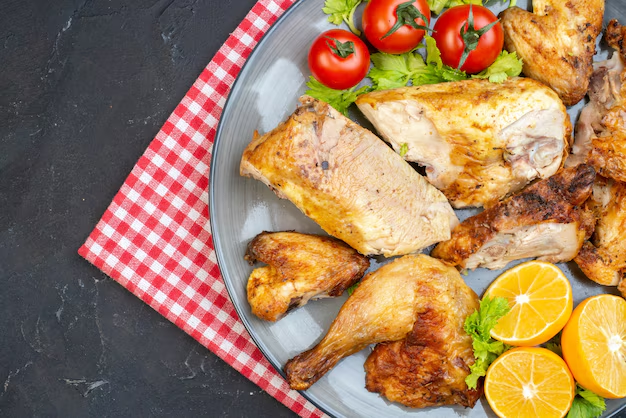How Long Does Cooked Chicken Really Last in the Fridge?
If you've ever found yourself staring at that leftover chicken in your fridge, wondering if it's still safe to eat, you're not alone. Cooked chicken is a staple in many households, but knowing how long it can safely sit in the refrigerator can be a bit confusing. Let's dive into this topic, exploring not just the lifespan of your chicken leftovers, but also covering some best storage practices and the signs that your chicken has gone bad.
🕰️ The Safe Timeline for Storing Cooked Chicken
General Guidelines
So, how long does cooked chicken last in the fridge? Typically, cooked chicken remains safe to eat for 3 to 4 days when stored properly. This time frame helps ensure that it stays fresh and less susceptible to bacteria, which tend to grow rapidly at temperatures between 40°F and 140°F.
Different Types of Chicken Dishes
- Grilled or Roasted Chicken: These can hold their quality and safety for the 3-4 day window.
- Chicken in Sauces (like curries or casseroles): The moisture content in these dishes can sometimes affect shelf life slightly, but the 3-4 day rule generally applies.
- Chicken Salads or Sandwiches: These mixtures can keep well for a similar period, although their components might affect texture over time.
Tip: Freeze to Extend Shelf Life
If you won’t consume the chicken within 3-4 days, consider freezing it. Cooked chicken can be frozen for up to 4 months. Always use airtight containers or heavy-duty freezer bags to prevent freezer burn and maintain quality.
📦 Best Practices for Storing Cooked Chicken
Proper Refrigeration Techniques
Cool It Quickly: Ensure cooked chicken gets into the fridge within two hours of cooking. If room temperature is high, reduce this time to one hour.
Store Smartly: Put leftovers in shallow, airtight containers. This promotes quick cooling and reduces the risk of bacterial growth.
Label Everything: Always label your containers with the date. This helps you keep track of how long the food has been stored.
Don't Forget About the Refrigerator
Keep your fridge at or below 40°F (4°C). Regularly check temperatures with a reliable fridge thermometer. This helps minimize the growth of harmful bacteria like Salmonella and Listeria.
🔍 Recognizing Spoiled Chicken
What to Watch Out For
Despite your best efforts, sometimes chicken may spoil. Here are some signs:
- Smell: Any sour or off odor means your chicken has likely gone bad.
- Appearance: Look for any green or gray patches, or a slimy texture. These are indications of spoilage.
- Taste: It’s better not to taste chicken to see if it's gone bad; rely on the smell and appearance instead.
Reminder: When in Doubt, Throw it Out
If you're unsure whether your chicken is still good, it's safest to throw it away. Better safe than sorry when it comes to potential foodborne illness.
😊 Additional Tips for Handling Chicken
Keeping It Fresh from the Start
- Buy Smart: Always purchase chicken close to the end of your shopping trip to minimize the time it spends out of refrigeration.
- Storage Materials: Use glass or high-quality plastic containers for storing leftovers. They maintain temperature better and don't retain food odors.
Cooking Tips for Safety
- Cook Thoroughly: Ensure chicken is cooked to an internal temperature of 165°F (74°C).
- Avoid Cross-Contamination: Always use different cutting boards and utensils for raw and cooked chicken to prevent transferring bacteria.
🔑 Key Takeaways for Safe Chicken Storage
Here's a quick summary to help keep your chicken fresh and your mind at ease:
- Refrigerate Cooked Chicken: Store within 2 hours, consume within 3-4 days.
- Freeze for Future Use: Extend life up to 4 months in the freezer.
- Trust Your Senses: Bad smell, appearance, or texture means time to toss.
- Organize Smartly: Label containers with dates and use the right storage solutions.
🍽️ Conclusion: Enjoying Chicken Safely
Understanding and following these guidelines allows you to enjoy cooked chicken without worry. Not only will your meals taste better, but you'll also maintain food safety, a key component of a healthy kitchen practice. Keeping track of how long your chicken has been stored, identifying any signs of spoilage, and using best practices for refrigeration and freezing are the pillars of safe, smart, and delicious chicken consumption. Now, the next time you open your fridge, you can confidently plan your meals knowing your chicken is good to go!
Stay safe, plan wisely, and enjoy every bite! 🍗

